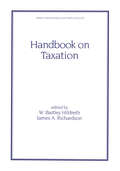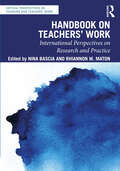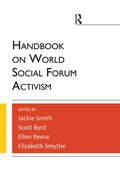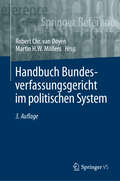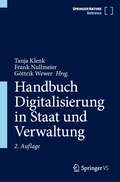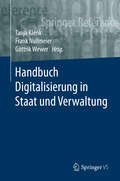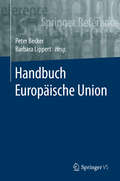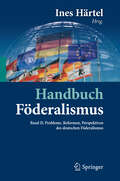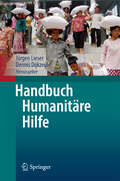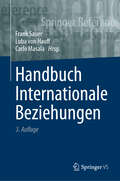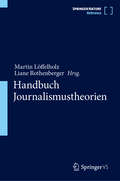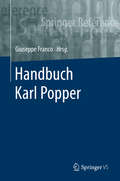- Table View
- List View
Handbook on Taxation (Public Administration And Public Policy Ser. #72)
by W. Bartley Hildreth James A. RichardsonA groundbreaking reference, this book provides a comprehensive review of tax policy from political, legal, constitutional, administrative, and economic perspectives. A collection of writings from over 45 prominent tax experts, it charts the influence of taxation on economic activity and economic behavior. Featuring over 2400 references, tables, equations, and drawings, the book describes how taxes affect individual and business behavior, shows how taxes operate as work and investment incentives, explains how tax structures impact different income groups, weighs the balanced use of sales, property, and personal income taxes, traces the influence of recent tax changes, and more.
Handbook on Teachers’ Work: International Perspectives on Research and Practice (Critical Perspectives on Teaching and Teachers’ Work)
by Nina BasciaThe Handbook on Teachers’ Work brings together research and evidence-based authoritative writings from across the globe that explicitly theorizes and studies teachers’ work.Drawing on research from twelve countries across 6 continents, the chapters are grouped into themes that represent key issues related to work from global perspectives, including: The Political and Policy Contexts of Teachers' Work Teaching as an Occupation Diverse Teacher Identities and Roles Teaching as Collective and Relational Work; and Teaching and Activism The volume explores the idea of teaching as an occupation with a history and trajectory that are shaped by political economies; historical progressions; organizational structures; social relations among educators, students, and others; teachers’ career and labor patterns; their professional norms; and raced, gendered, classed, and culturally linked expectations of teachers and about public schooling.This essential handbook will be of interest to teacher educators, policymakers, and students and researchers in the fields of teachers’ work, curriculum theory, educational policy and politics, foundations of education, multicultural education and teacher education.
Handbook on World Social Forum Activism
by Jackie Smith Scott Byrd Elizabeth Smythe Ellen ReeseThe World Social Forum (WSF) has become the focus for a diverse array of movements advancing alternative visions of globalisation. The numerous WSF's have helped to connect activists in an increasingly dense network of advocates for radical social change. They have mobilised hundreds of thousands of people and may be one of the most important political developments of our time. The Handbook of World Social Forum Activism brings together leading scholars of the social forum process from North America and Europe. The collection contributes to the ongoing process of reflection from the WSF experience, and is accessible to activists, students and scholars alike.
Handbuch Armut und soziale Ausgrenzung
by Ernst-Ulrich Huster Jürgen BoeckhDas Handbuch präsentiert den „state of the art“ zu den Themen Armut und soziale Ausgrenzung. Beides nimmt in unserer Gesellschaft, in Europa und weltweit zu. Dies betrifft nicht nur die materielle Versorgung und Verteilung, sondern bezieht weitere soziale, ökonomische und politische Aspekte ein. In der mittlerweile 4. Auflage greift das Handbuch diese multifaktoriellen Zusammenhänge auf und fügt zentrale Erkenntnisse von Theorie und sozialer Praxis zusammen. Es zeichnet sich durch einen interdisziplinären Zugang aus, in dem sich eine Vielzahl human-, geistes- und sozialwissenschaftlicher Perspektiven bündeln. So werden u.a. wirtschaftliche Zusammenhänge, sozialethische Bewertungsmaßstäbe, juristische und verwaltungsmäßige Bearbeitungsformen, Bewältigung in und durch motopädagogische und ästhetische, bzw. medienpädagogische Praxis, geschichtliche Erfahrungen von und im Umgang mit Armut, soziale Beteiligungsstrukturen und individuelle Problemlösungskapazitäten dargestellt.
Handbuch Außenpolitik Österreichs
by Markus Kornprobst Martin Senn Franz EderDas Handbuch ist vollständig als Open Access Publikation verfügbar.Dieses Handbuch bietet eine umfassende Analyse der Außenpolitik Österreichs in der Zweiten Republik. Es behandelt die Rahmenbedingungen, Akteure und Prozesse der Außenpolitik und erschließt deren Wesen und Wirkung in verschiedenen Politikbereichen sowie gegenüber einzelnen Ländern, Regionen und internationalen Organisationen. Das Handbuch ist ein Referenzwerk für die Forschung, ein Einführungswerk für die Lehre und ein Nachschlagewerk für die Praxis in Politik, Verwaltung und Zivilgesellschaft.
Handbuch Bundesverfassungsgericht im politischen System
by Robert Chr. van Ooyen Martin H. W. MöllersDas politikwissenschaftliche Standardwerk unterzieht Stellung und Funktion des Bundesverfassungsgerichts im Spannungsfeld von Politik und Recht einer umfassenden sozial- und rechtswissenschaftlichen Analyse. Vollständig überarbeitet und aktualisiert bietet die dritte Auflage fundierte Einblicke in den politischen Prozess und die (rechts-)politischen Implikationen der Verfassungsrechtsprechung. Dabei werden theoretische Grundfragen der Verfassungsgerichtsbarkeit, methodische Zugänge der Analyse, vergleichende Bezüge,historische Entwicklungen und Konfliktlinien miteinbezogen. Die dritte Auflage beinhaltet 70 Beiträge und ist als Reference-Handbuch konzipiert.
Handbuch Digitalisierung in Staat und Verwaltung
by Göttrik Wewer Tanja Klenk Frank NullmeierDigitalisierung prägt nicht nur die Marktökonomie, sie gestaltet auch den öffentlichen Sektor neu. Das Handbuch liefert auch in der 2. Auflage einen wissenschaftlichen Überblick zum Stand der Digitalisierung in Staat und Verwaltung. Die 95 Beiträge erläutern Leitprinzipien einer digitalen Staatsentwicklung, Instrumente einer digitalisierten Verwaltung und Anwendungen digitaler Steuerung in einzelnen Politikfeldern. Das Handbuch liefert zudem den aktuellen Diskussionsstand zu Grundfragen der Sicherung von Freiheit und Privatheit, sozialer Gerechtigkeit und Demokratie unter Bedingungen der Digitalisierung und wurde nach den Entwicklungen der Corona-Krise 2020/2021 grundlegend aktualisiert und erweitert.
Handbuch Digitalisierung in Staat und Verwaltung (Springer Reference Sozialwissenschaften Ser.)
by Göttrik Wewer Tanja Klenk Frank NullmeierDigitalisierung prägt nicht nur die Marktökonomie, sie gestaltet auch den öffentlichen Sektor neu. Das Handbuch liefert erstmals einen wissenschaftlichen Überblick zum Stand der Digitalisierung in Staat und Verwaltung. Die über 50 Beiträge erläutern Leitprinzipien einer digitalen Staatsentwicklung, Instrumente einer digitalisierten Verwaltung und Anwendungen digitaler Steuerung in einzelnen Politikfeldern. Das Handbuch liefert zudem den aktuellen Diskussionsstand zu Grundfragen der Sicherung von Freiheit und Privatheit, sozialer Gerechtigkeit und Demokratie unter Bedingungen der Digitalisierung.
Handbuch Energieeffizienz im Quartier: Clever versorgen, umbauen, aktivieren
by Christa Reicher Anke SchmidtIm Rahmen des Fortschrittskollegs Energieeffizienz im Quartier wurde das Thema von 11 DoktorandInnen unterschiedlicher Disziplinen untersucht. In den Arbeiten werden Lösungsansätze und Empfehlungen für Akteure der Energiewende entwickelt.
Handbuch Entwicklungsforschung
by Karin Fischer Gerhard Hauck Manuela BoatcăDas Handbuch führt in den aktuellen Diskussionsstand der sozialwissenschaftlichen Entwicklungsforschung ein und liefert einen systematischen Überblick über die Vielfalt der vertretenen Paradigmen und Forschungsfelder. In die 2. Auflage wurden drei neue Kapitel aufgenommen. Die anderen Beiträge wurden aktualisiert. Ein Sach- und Personenverzeichnis vervollständigt den Band.
Handbuch Europarecht: Band 4/I Europäische Grundrechte: Allgemeine Lehren, personenbezogene und kommunikative Grundrechte, Klimaschutzansprüche
by Walter FrenzDie europäischen Grundrechte haben eine intensive Konjunktur vor allem in den Bereichen Daten- und Klimaschutz. Dort haben sie auch eine wichtige Funktion, um die UN-Ziele für eine nachhaltige Entwicklung zu erreichen, welche Maßnahmen zum Klimaschutz umfassen (SDG 13). Inwieweit bestehen Ansprüche auf Klimaschutz parallel zum BVerfG-Klimabeschluss? Die EGMR-Judikatur wird durchgehend stark einbezogen, ist sie doch vielfach noch immer Leitbild für die Auslegung der EGRC. Das gilt vor allem für die kommunikativen Grundrechte mit dem Dauerkonflikt zwischen Medienberichterstattung und Persönlichkeitsrecht. Insgesamt hat sich die EU-Grundrechtsdogmatik sowohl in der Rechtsprechung als auch in der Literatur erheblich fortentwickelt und wird umfassend kritisch gewürdigt – so zur Zulässigkeit der Vorratsdatenspeicherung. Das gilt auch für die neue Rolle des BVerfG zur Durchsetzung der EU-Grundrechte und für die Flüchtlingsproblematik.
Handbuch Europarecht: Band 4/II Europäische Grundrechte: Wirtschaftsgrundrechte, Gleichheits-, soziale und Bürgerrechte
by Walter FrenzDie europäischen Wirtschaftsgrundrechte wurden stark fortentwickelt, indem der EuGH die immer wieder beklagte grobmaschige Prüfungsdichte deutlich erhöht hat. Daraus ergeben sich wichtige Konsequenzen für die Verwirklichung des Klimaschutzes auf EU-Ebene, die mit dem BVerfG-Klimabeschluss abgeglichen werden. Wie können damit die UN-Ziele für eine nachhaltige Entwicklung erreicht werden, zu denen Maßnahmen zum Klimaschutz gehören (SDG 13)? Insoweit von Bedeutung sind auch die solidarischen Grundrechte vor allem in Gestalt des Umweltschutzes. Die sozialen Grundrechte hatten ihre Bewährungsprobe im Zusammenhang mit Covid 19. Ausführlich behandelt werden auch die Gleichheits- und Bürgerrechte, die justiziellen Rechte unter starkem Rückgriff auf die insoweit vielfältige EGMR-Judikatur, aber auch die jüngere EuGH-Rechtsprechung in Kartellsachen. Insgesamt erfolgt eine nähere Bewertung mit Blick auf die konkreten Konsequenzen.
Handbuch Europäische Union
by Peter Becker Barbara LippertIn diesem Handbuch wird das grundlegende Wissen über die Europäische Union auf dem aktuellen Stand der Forschung präsentiert. Ausgewiesene Expertinnen und Experten befassen sich in den rund vierzig Einzelbeiträgen mit der Entstehungsgeschichte, den Institutionen und Akteuren sowie den wichtigsten Politikbereichen und Zukunftsfragen der EU. Die Darstellungen gehen von den normativen, vertragsrechtlichen Grundlagen aus, geben Einblicke in die politische Praxis und greifen problemorientiert Kontroversen in Politik und Wissenschaft auf.
Handbuch Familie: Band I: Gesellschaft, Familienbeziehungen und differentielle Felder
by Jutta Ecarius Anja SchierbaumDas Handbuch Familie in der überarbeiteten, aktualisierten und erweiterten 2. Auflage repräsentiert den theoretischen und empirischen Stand der Familienforschung aus interdisziplinärer Sicht. Mit dem Schwerpunkt auf Gesellschaft und differentielle Felder werden besondere Konstellationen von Familie und Familienbeziehungen in einem vollständigen Überblick beschrieben und dargestellt. In der neu strukturierten, überarbeiteten und erweiterten Auflage wird ein umfassendes Bild von Familie als Beziehungs- und Lebensform gezeichnet, in das die aktuellen wissenschaftlichen Erkenntnisse und Forschungsergebnisse einfließen.
Handbuch Familie: Band II: Erziehung, Bildung und pädagogische Arbeitsfelder (Springer Reference Sozialwissenschaften Ser.)
by Jutta Ecarius Anja SchierbaumDas Handbuch Familie repräsentiert den theoretischen und empirischen Stand der Familienforschung aus interdisziplinärer Sicht. Mit dem Schwerpunkt auf Kinder und Erziehung, Bildungsinstitutionen, Kindeswohl und (sozial-)pädagogische Arbeitsfelder wird die gesamte Breite der Thematik in einem vollständigen Überblick beschrieben und dargestellt. In der neu strukturierten Auflage wird ein umfassendes Bild von Familie als einer pädagogischen Institution gezeichnet, in das die aktuellen wissenschaftlichen Erkenntnisse und Forschungsergebnisse einfließen.
Handbuch Familiensoziologie
by Karsten Hank Anja Steinbach Oliver Arránz BeckerDieser Band bietet einen umfassenden Einblick in die große thematische Breite und Tiefe der familiensoziologischen Forschung. Dabei geht es um die Konstanten und Differenzierungen des familialen Lebens in den verschiedensten Regionen der Welt sowie die unterschiedlichen methodischen und theoretischen Ansatzpunkte in der Familienforschung. Schließlich wird eine Vielzahl familialer und sozialstruktureller Fragestellungen einschließlich ihrer empirischen Fundierung aufgegriffen, referiert und kritisch kommentiert. Heiratsmarkt, Fertilität, Arbeitsteilung, Generationenbeziehungen, Trennung, Bildung, Mobilität, Familienpolitik und -recht sind nur einige Beispiele für den breiten thematischen Zugriff des vorliegenden Bandes, welcher in vier thematischen Abschnitten und dreiunddreißig Beiträgen systematisch das Feld der Familiensoziologie beschreibt.
Handbuch Föderalismus - Föderalismus als demokratische Rechtsordnung und Rechtskultur in Deutschland, Europa und der Welt
by Ines HärtelBand I behandelt die historische Entwicklung, die philosophischen und rechtlichen Grundlagen, die politische Dimension und die ökonomische Grammatik des Föderalismus. Er stellt differenziert Inhalte und Strukturen der bundesstaatlichen Ordnung in Deutschland dar. Zudem zeigt er die Bedeutung von Rechtskultur, Verfassung und Kompetenzverteilung für den Föderalismus auf.
Handbuch Gemeinwohl
by Christian HiebaumDer Begriff des Gemeinwohls gehört seit jeher zum Grundinventar des politischen Denkens und ist dabei so umstritten wie kaum ein anderer Begriff, dessen wir uns bei der Bewertung sozialer Verhältnisse und kollektiv verbindlicher Entscheidungen bedienen. Dieses Handbuch beleuchtet aus verschiedenen Perspektiven der Geistes-, Sozial- und Rechtswissenschaften die für das Gemeinwohldenken zentralen Konzepte, Probleme, Argumente und empirischen Befunde und stellt einschlägige Debatten überblicksartig dar.
Handbuch Genossenschaftswesen
by Ingrid Schmale Johannes Blome-Drees Frank Schulz-Nieswandt Nicole Göler von Ravensburg Alexander JungmeisterDas Handbuch spiegelt eine moderne Fassung transdisziplinärer Wissenschaft und heterogener Praxis. Aktuelle Grundlagen und Entwicklungen der Genossenschaftswissenschaft wie auch des Genossenschaftswesens werden zeitgemäß aufbereitet. Bis auf wenige Ausnahmen beziehen sich die Beiträge auf Genossenschaften in Deutschland, Österreich und der Schweiz. Im Vordergrund steht die Vermittlung wissenschaftlicher Methoden und Konzeptionen. Einen breiten Raum nimmt die anwendungsorientierte Analyse spezifischer betriebswirtschaftlicher Probleme der Genossenschaften ein. Anders als in einem Lexikon oder Wörterbuch sind die gesammelten Beiträge nach verschiedenen Themenbereichen geordnet. Dies ermöglicht den Leserinnen und Lesern einen schnellen Zugriff auf die jeweils interessierenden Fragestellungen.
Handbuch Geschichts- und Politikdidaktik
by Georg Weißeno Béatrice ZieglerDieses Handbuch fasst die Diskussion zur Geschichts- und Politikdidaktik systematisch zusammen. Die Beiträge sind aus dem Blickwinkel der jeweiligen Didaktik als eigenständiger Wissenschaftsdisziplin verfasst, benennen die entsprechenden Kontroversen und zeigen die wichtigsten Forschungsentwicklungen auf. Die Zielgruppe des Handbuches sind Wissenschaftlerinnen und Wissenschaftler, die sich einen breiten und fundierten Überblick zu einer Thematik verschaffen wollen – von Studierenden bis zu Professorinnen und Professoren.
Handbuch Humanitäre Hilfe
by Jürgen Lieser Dennis DijkzeulMenschen, die infolge von Gewaltkonflikten oder Naturkatastrophen in eine humanitäre Notlage geraten sind, benötigen Hilfe. Diese ethische Selbstverständlichkeit hat mit der Gründung des Roten Kreuzes vor mehr als 150 Jahren einen institutionellen Rahmen bekommen. Seitdem ist die humanitäre Hilfe, also das organisierte und professionelle Helfen in humanitären Krisen und Katastrophen, stark gewachsen. Humanitäre Organisationen sind fast weltweit aktiv. In der Praxis erweist sich die humanitäre Hilfe als eine große Herausforderung. Hilfsorganisationen stehen unter einem hohen Erwartungs- und Zeitdruck: Sie sollen schnell, effektiv und reibungslos Hilfe zum Überleben leisten. Die Hilfe soll unparteiisch, neutral und nachhaltig sein und sich allein an den Bedürfnissen der betroffenen Menschen orientieren. Staatliche Geber, private Spender und auch die Hilfeempfänger verlangen Rechenschaft über den sinnvollen Einsatz der Hilfsgelder. Seit Jahren nehmen Naturkatastrophen in Zahl und Umfang zu. Gewaltkonflikte entwickeln sich zu chronischen Krisen mit einer Kriegswirtschaft, die es schwieriger macht, die Betroffenen zu unterstützen. Die Helferinnen und Helfer sehen sich konfrontiert mit zunehmend komplexeren Notlagen, divergierenden Geberinteressen, politischer Einflussnahme und konkurrierenden Hilfsangeboten. Sie geraten zwischen die Fronten und werden Opfer von gewaltsamen Übergriffen. Auch Missbrauch und politische Instrumentalisierung kommen vor. Dieses Buch trägt zu einem besseren Verständnis von humanitären Krisen und ihren Folgen bei. Es zeigt, wie sich die humanitäre Hilfe in einem internationalen System entwickelt hat und wie die verschiedenen Akteure ihre Rolle definieren und ausfüllen. Es zeigt auch, wie schwierig es ist, dem hohen ethischen Anspruch an unparteiische und von politischen Interessen unabhängige Hilfe gerecht zu werden. Die Autorinnen und Autoren - Vertreter von Hilfsorganisationen und Wissenschaft - zeigen aus unterschiedlichen Perspektiven auf, wie humanitäre Hilfe zwischen Anspruch und Wirklichkeit versucht, dem weltweit wachsenden Hilfebedarf gerecht zu werden.
Handbuch Internationale Beziehungen
by Carlo Masala Frank Sauer Luba Von HauffDas Handbuch Internationale Beziehungen erscheint mittlerweile in der dritten, vollständig überarbeiteten und erweiterten Auflage. Das Handbuch vermittelt einen umfassenden Überblick über den state of the art der politikwissenschaftlichen Teildisziplin Internationale Beziehungen in deutscher Sprache. Es präsentiert theoretische und methodische Grundlagen der Forschung in den Internationalen Beziehungen und stellt die wesentlichen Akteure und Problemfelder der internationalen Politik vor. Das Nachschlagewerk richtet sich sowohl an Wissenschaftler*innen als auch an Studierende und die interessierte Öffentlichkeit.
Handbuch Intersektionalitätsforschung
by Boka En Katharina JäntschiDas Thema Intersektionalität wird zunehmend in unterschiedlichen Feldern und mit Blick auf verschiedene theoretische wie methodisch-methodologische Ansätze diskutiert. Das Handbuch bietet einen differenzierten Überblick über diese internationalen wie interdisziplinären Diskussionen und öffnet den Blick für weitere Forschungsperspektiven.
Handbuch Journalismustheorien
by Martin Löffelholz Liane RothenbergerDie aktualisierte, neu strukturierte und um 19 Originalbeiträge ergänzte Neuauflage des Handbuchs Journalismustheorien liefert einen systematischen und detaillierten Überblick über die theoretischen Ansätze der Journalismusforschung. Zehn thematische Abschnitte ermöglichen schnelle Einstiege in die jeweiligen Theorienkomplexe und schaffen eine verständliche Orientierung über die Grundlagen, Entwicklungsstränge, Konzepte und Problemfelder der Journalismustheorien sowie darüber hinaus zu theoretischen Ansätzen zu Interrelationen des Journalismus mit Bereichen wie Kultur, Politik, Religion, Sport, Wirtschaft oder Wissenschaft. Für Studierende und Forschende der Journalistik, der Kommunikationswissenschaft und angrenzender Disziplinen bildet das Handbuch ein Standardwerk zum Verständnis des komplexen wissenschaftlichen Diskurses über die theoretischen Ansätze der Journalismusforschung.
Handbuch Karl Popper (Springer Reference Geisteswissenschaften Ser.)
by Giuseppe FrancoDieses Handbuch bietet einen verlässlichen, systematischen und umfassenden Zugang einerseits zu Leben und Werk Karl Poppers, andererseits zur breiten Wirkung des Philosophen in Wissenschaft, Politik und Gesellschaft.
